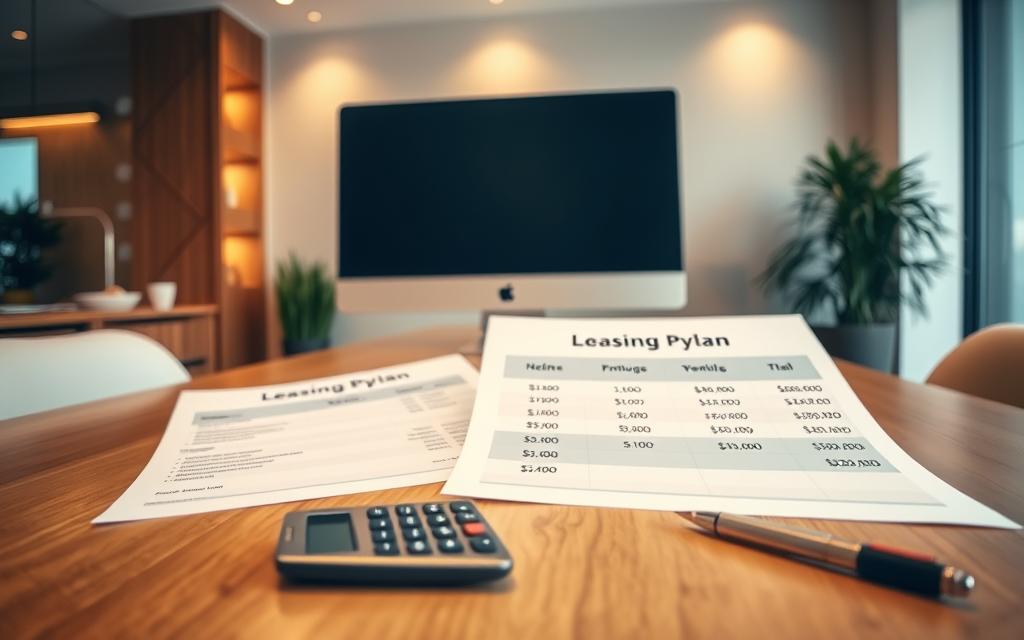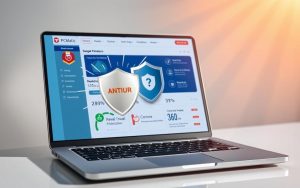Table of Contents
Businesses today need flexible tech solutions. Many prefer renting over buying to stay updated with the latest hardware. This approach cuts costs and boosts efficiency.
Leasing allows firms to access high-end laptops and desktops without heavy upfront investments. It’s ideal for startups and growing teams. Payment plans often include maintenance and upgrades.
Popular providers like Aaron’s and Progressive Leasing offer tailored programs. These options help businesses scale without financial strain. The demand for such services keeps rising.
Rent-to-own models provide long-term flexibility. Companies can refresh devices as needed. This ensures teams always have reliable tools.
Introduction to Computer Leasing
Tech leasing offers businesses a smart way to stay current without heavy spending. Instead of buying, firms pay for equipment over time. This model cuts upfront costs and shifts liability to providers like Quill.
- Operating leases: Short-term, upgrade-friendly agreements.
- Finance leases: Long-term with eventual ownership.
- Rent-to-own: Flexible payments leading to purchase.
Approval often hinges on credit history. Strong scores secure better terms. Providers assess risk before offering plans.
Rapid technology obsolescence makes leasing appealing. Upgrading every few years ensures peak performance. Leasing companies handle old gear responsibly, reducing e-waste.
Environmental perks include certified recycling programs. Sustainable disposal aligns with corporate green goals.
Which Companies Lease Their Computers? Top Providers
Several trusted firms offer flexible hardware solutions for modern businesses. From rent-to-own models to tailored agreements, these providers simplify access to cutting-edge devices. Below are standout choices for every need.

Aaron’s: Rent-to-Own Laptops and Desktops
Aaron’s specializes in affordable rent-to-own plans. Businesses can start with minimal upfront costs and own devices over time. Upgrades are seamless, ensuring teams never lag behind.
Quill: Flexible Leasing for Small Businesses
Quill caters to small businesses with scalable agreements. Their plans include maintenance and quick replacements. This service minimizes downtime and keeps workflows smooth.
Progressive Leasing: Customizable Lease-to-Own Plans
Progressive stands out with transparent terms and a payment estimator tool. Clients see costs upfront, avoiding surprises. Key perks include:
- 24/7 customer service via phone or chat.
- Data-driven plans matching usage patterns.
- Early buyout option with discounted fees.
Partnering with nationwide retailers, Progressive also offers in-store leasing for convenience.
Benefits of Leasing Computers for Your Business
Modern enterprises gain strategic advantages through tech leasing solutions. This model aligns with dynamic operational needs while optimizing budgets. Below are key perks that drive adoption across industries.
Lower Upfront Costs
Purchasing hardware outright strains cash flow. Leasing spreads expenses into manageable monthly payments. Startups and SMBs particularly benefit from preserved capital.
With minimal initial outlays, firms allocate funds to growth areas like marketing or R&D. Predictable costs simplify financing forecasts.
Flexibility to Upgrade Technology
Tech evolves rapidly. Leasing ensures access to cutting-edge devices without sunk costs. Providers handle replacements, often including:
- Automatic refresh cycles (every 2–3 years).
- Seamless device swaps during contract terms.
- No disposal hassles for outdated equipment.
This agility keeps teams competitive with minimal downtime.
Tax Deductible Payments
Lease payments often qualify as operational expenses. This unlocks deductions under IRS Section 179. Key advantages include:
| Benefit | Impact |
|---|---|
| Section 179 Deduction | Write off full lease amount annually |
| State Incentives | Additional credits for tech adoption |
| Simplified Accounting | Fixed payments vs. depreciation tracking |
Consult a CPA to maximize savings. Some providers even offer free tax consultation services.
Understanding Leasing Payment Structures
Payment structures define the flexibility of tech leasing agreements. Businesses can choose plans that align with cash flow and growth goals. Providers like Progressive offer tailored solutions to fit diverse budgets.

Monthly Payment Plans
Fixed monthly installments simplify budgeting. These plans often include maintenance, reducing hidden costs. Shorter terms (12–24 months) suit rapid upgrade cycles.
No-Money-Down Options
Startups benefit from zero upfront costs. Approval depends on credit history, but strong profiles secure favorable terms. This model preserves capital for operational needs.
End-of-Lease Purchase Choices
Progressive offers multiple end-of-lease options. Clients can:
- Buy devices at fair market value.
- Opt for $1 buyout agreements.
- Return equipment after inspection.
| Option | Best For |
|---|---|
| Fair Market Value | Businesses wanting latest upgrades |
| $1 Buyout | Long-term ownership seekers |
| Lease Extensions | Short-term project needs |
Residual value calculations ensure transparency. Providers disclose fees early, avoiding surprises. These solutions make leasing a strategic option for scaling teams.
How to Choose the Right Leasing Company
Selecting the best leasing partner requires careful evaluation of key factors. Prioritize providers that align with your operational goals and budget. Below are actionable steps to streamline your decision.

Assessing Your Business Needs
Businesses should start by analyzing their tech requirements. Consider device types, usage frequency, and scalability needs. Providers like Quill offer dedicated specialists to match solutions with your data workflows.
Key questions to ask:
- How many devices are needed annually?
- Do teams require high-performance service support?
- Is rapid upgrade flexibility critical?
Comparing Lease Terms and Conditions
Scrutinize contract details to avoid hidden fees. Look for transparent pricing and upgrade clauses. Below is a comparison of common lease structures:
| Term | Advantage | Ideal For |
|---|---|---|
| 12-month | Lower commitment | Startups testing needs |
| 36-month | Reduced monthly costs | Stable operations |
| Flexible-end | Early termination options | Seasonal projects |
Providers with 24/7 technical service reduce downtime risks. Verify if maintenance is included or billed separately.
Evaluating Customer Support and Reputation
Reliable providers prioritize customers with responsive assistance. Check third-party reviews (BBB, Trustpilot) and industry certifications like NACLB. Red flags include:
- Slow response times (>24 hours).
- Vague escalation procedures for disputes.
- Lack of transparency in data handling policies.
Firms like Progressive Leasing guarantee 2-hour response windows. This ensures quick resolutions for critical issues.
Technology Leasing for Small Businesses
Tech leasing for small businesses combines affordability with cutting-edge performance. Providers like Quill serve 500,000+ firms, offering scalable solutions for growing teams. This model ensures access to premium products without straining budgets.

- Scalability: Adjust device quantities as teams expand.
- Multi-location support: Deploy hardware across offices seamlessly.
- Energy-efficient options: Reduce costs and environmental impact.
Disaster recovery integration minimizes downtime. Employee training resources ensure smooth adoption. These features power long-term success.
| Feature | Benefit |
|---|---|
| Flexible Terms | Align payments with cash flow |
| Upgrade Cycles | Stay current with tech trends |
| 24/7 Support | Quick resolution for IT issues |
Small businesses gain a competitive edge. Leasing bridges the gap between ambition and resources effectively.
Leasing vs. Buying Computers: Key Differences
Financial strategies for hardware acquisition vary between leasing and purchasing. Each model affects cash flow, tax benefits, and long-term expenses differently. Smart decisions require understanding these core contrasts.
Total cost comparisons reveal leasing often wins for short-term needs. Buying demands upfront capital but may save over 5+ years. Leasing eliminates disposal costs, as providers handle outdated gear.
Balance sheets reflect leases as operational expenses. Purchases appear as assets with depreciation curves. This impacts business credit and investor perceptions differently.
Tech refresh cycles favor leasing. Upgrades every 2–3 years keep teams competitive. Owners face steep resale value drops after 36 months.
Liquidity matters for growing firms. Leasing preserves capital for hiring or R&D. Buyers tie funds to hardware that loses value rapidly.
“Ownership disposal costs eliminated via leasing.”
Simulate costs before deciding. Factor in maintenance, IT labor, and downtime risks. Leasing bundles these into predictable payments.
Environmental and Maintenance Advantages of Leasing
Sustainable equipment management is now achievable through leasing solutions. Providers handle eco-friendly disposal, ensuring outdated devices don’t harm the planet. This aligns with corporate sustainability goals effortlessly.
- Certified recycling: Devices are dismantled responsibly, with 90%+ materials reused.
- Energy monitoring: Track power usage to optimize efficiency and cut costs.
- Proactive upkeep: Scheduled maintenance prevents downtime and extends device life.
Leasing firms like Lenovo offer refurbished laptops and servers, reducing e-waste further. These solutions meet strict hazardous material compliance, protecting both businesses and ecosystems.
“Carbon footprint reports help firms measure environmental impact transparently.”
Tax incentives often reward green initiatives. Leasing turns tech upgrades into a force for positive change—without sacrificing performance or budgets.
Frequently Overlooked Leasing Perks
Many firms miss hidden value in standard lease agreements. Beyond hardware access, providers bundle benefits that boost productivity and savings. These extras often go unnoticed during contract reviews.
- Bundled cybersecurity: Many plans include antivirus or firewall tools at no extra cost.
- Extended warranties: Coverage often rolls over after upgrades, protecting new devices.
- Trade-in credits: Accumulate value for future upgrades or accessory purchases.
Providers like Quill offer vendor negotiation services. They secure bulk discounts on accessories like docking stations or monitors. This simplifies procurement for growing teams.
Customization options are another perk. Employees can choose ergonomic keyboards or privacy screens. These accessories enhance comfort and efficiency without upfront costs.
“Lease agreements may include software bundles worth thousands annually.”
Always review contract addendums. Hidden gems like IT training credits or cloud storage upgrades can deliver unexpected value. Smart firms leverage these to stretch budgets further.
Conclusion
Choosing the right tech solution can transform operations. Providers like Aaron’s, Quill, and Progressive offer tailored plans to fit any business need. Leasing keeps costs predictable while ensuring access to modern tools.
For firms weighing options, consider total savings versus ownership. Monthly payments often include maintenance, reducing hidden expenses. Start by comparing terms from top vendors today.
Future trends point to greener leasing models and AI-driven upgrades. Take action—reach out to providers for custom quotes. The right plan fuels growth without straining budgets.
FAQ
What are the top companies that lease computers?
Leading providers include Aaron’s, Quill, and Progressive Leasing. These companies offer flexible rental and lease-to-own options for desktops, laptops, and accessories.
How does computer leasing help small businesses?
Leasing reduces upfront costs, provides access to the latest technology, and often includes tax-deductible payments, making it ideal for growing businesses.
What payment structures are available for leasing?
Options include monthly payments, no-money-down plans, and end-of-lease purchase choices, allowing businesses to select the best fit for their budget.
Is leasing better than buying computers?
Leasing offers flexibility, lower initial expenses, and easy upgrades, while buying may be better for long-term ownership. The choice depends on your business needs.
What should I look for in a leasing company?
Compare lease terms, customer support, and reputation. Ensure the provider aligns with your business goals and offers scalable solutions.
Are there environmental benefits to leasing computers?
Yes. Leasing promotes recycling and reduces e-waste, as providers often refurbish or upgrade returned equipment, supporting sustainability.
Can I upgrade my leased equipment before the term ends?
Many leasing companies allow upgrades, ensuring you stay current with technology without heavy upfront investments.









